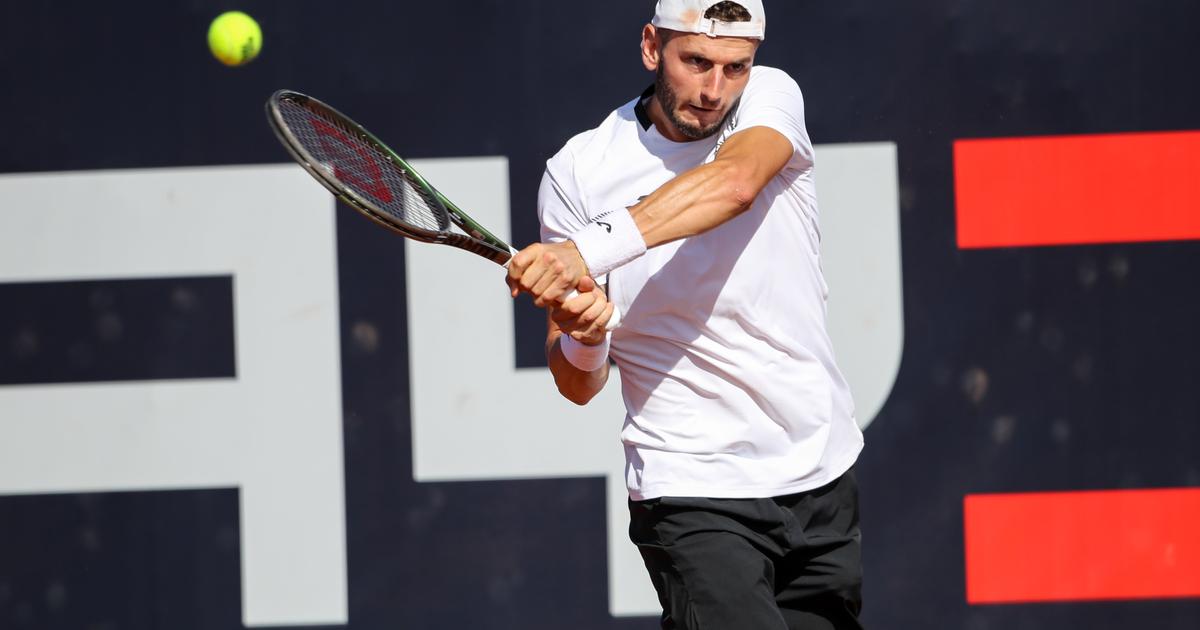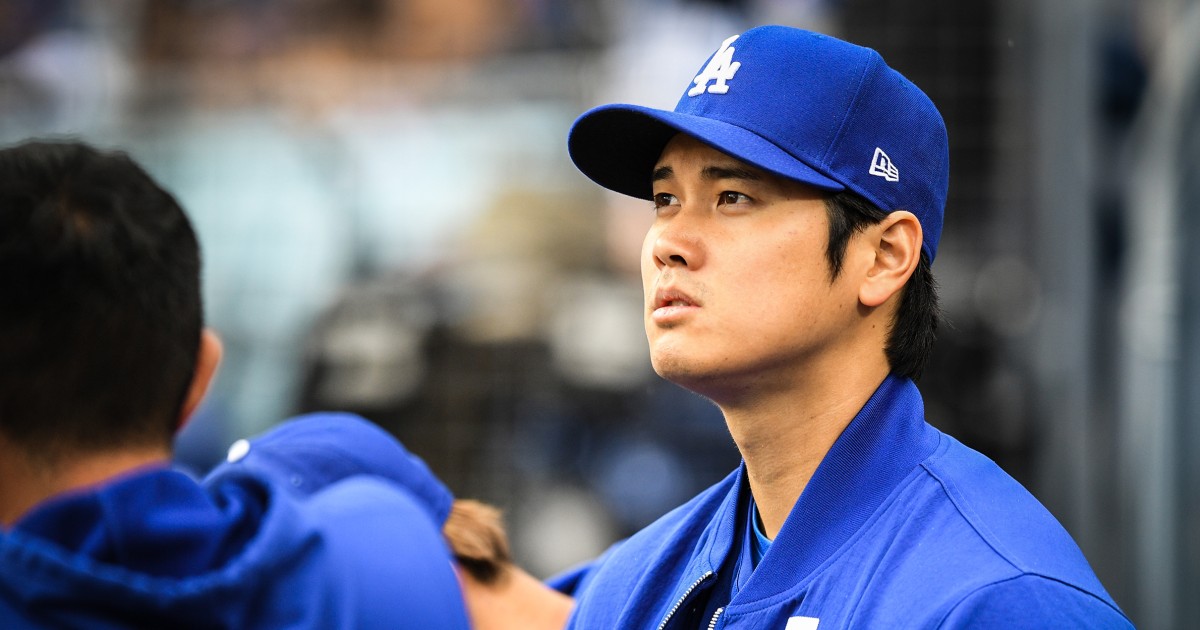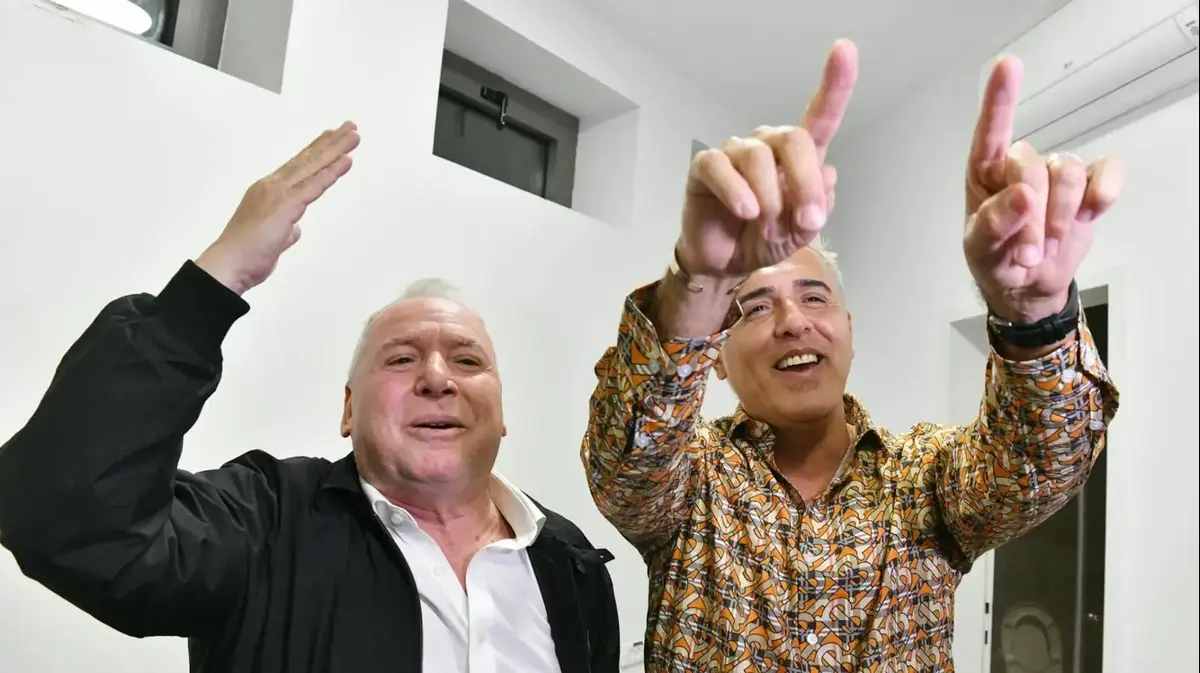By Luis A. Hernández Ojesto M. (Noticias Telemundo) and Guadalupe Venegas (NBC News)
With the cadence of the trumpets in chime and the characteristic tone as out of tune of the singers of the regional Mexican genre, the artist known as Peso Pluma has conquered the main positions of the music charts worldwide.
His duet with Eslabón Armado, Ella Baila Sola, has become the first song by a Mexican artist to rank in the top five spots on Billboard's list of the 100 most listened songs of the week.
In the popular music application Spotify, the Tapatío has been placed as the fifth most listened to artist worldwide, leaving a new mark for an artist of the regional Mexican genre.
"We're in shock that we're appearing on the lists [of the most listened to musicians] with people we've heard all our lives," the 23-year-old singer from Guadalajara, Jalisco, said when asked how he felt about his recent success in an English-language interview with journalist Guadalupe Venegas of our sister network NBC News.
"If I explain it to you, you wouldn't understand me, that's the moment I'm going through. Because it's something that you don't feel here [in my chest], to see all the people singing the songs that I made and continue to do with my cousin Tito, because it's our passion, it's what we like to do every day. To be in a hotel and start writing all day and then see people in a stadium singing them, it's unimaginable."
Featherweight during his performance at the Latin American Music Awards at the MGM Grand Garden arena in Las Vegas, April 20, 2023.John Locher / AP
Where does your stage name come from?
Although people know him as Featherweight, that's actually what the group is called, in which other musicians such as his cousin Tito also play. His real name is Hassan Emilio Kabande Laija, of Arab inspiration who, according to his grandmother, was where his ancestors came from.
With his deep and calm voice, the musician also known in Mexico as Doble P told Venegas how they adopted the name for their group.
[Korean pop star Moon Bin, 25, found dead in his home]
"We were playing a private event for boxer Marco Antonio Barrera, who was world champion in the featherweight category and it was he who told us: 'I was champion in that category' and there was just chemistry at that moment and we kept the name," he said.
Now, he says he gets carried away when he is called Featherweight.
On The Tonight Show with Jimmy Fallon
Featherweight described his appearance on the legendary television show of Jimmy Fallon, the host of The Tonight Show, as something out "of a movie."
"Since I was a kid I liked watching the show and I admire Jimmy a lot. Being there was like a dream, it was like being in a movie, an incredible experience," he said.
Featherweight played his hit Ella Baila Sola during his appearance on the Jimmy Fallon show a few days ago.
"We speak Spanish, that's the most important thing"
From his private concerts at celebrity Mexican parties, PesoPluma has gone on to some of the biggest music stages in the United States, including the Coachella festival in Southern California.
Last month the jaliscience caused a furor when he appeared on one of the stages of Coachella with the Mexican-American artist Becky G, with whom he sang his new duet Chanel.
"If we [Latin artists] come together, we can do many things, raising not only the name of our country, but of all of Latin America. It was seen at Coachella: most of the headliners, of the artists who were, are Latin American, we speak Spanish, that's the most important thing for us," he said.
The importance of the Mexican regional
The regional Mexican genre has been gaining followers in the United States at an unparalleled rate.
According to a Chartmetric analysis cited by NPR, the top three performers of the tumbled corridos subgenre to which Featherweight belongs, which includes Natanael Cano, Junio H. and Fuerza Regida have experienced exponential growth. For example, the reproductions of their songs went from 1.6 million in 2019 to 54.1 million in 2023, an annual growth rate of more than 140%.
Featherweight and Becky G at the 2023 Latin American Music Awards in Las Vegas, April 20. Mindy Small / Getty Images
Representing Latinos
"We have a Latin artist at the top of the charts, that's you and it's huge. You have become the person who has surpassed the top of all music charts, what does that mean for you? And I don't just mean you as a celebrity, as someone successful, but the culturally speaking significance that that has for Hispanics in this country. How does that make you feel?" asked Venegas.
"I feel very, very good. I know people are starting to get to know about this movement and I'm not the only one. I'm not the only one who paved a road, a lot of people made this possible and now I'm the one representing a whole genre to a whole country, and there are a lot of people who are fighting and battling and have a dream. I want to tell them that all dreams are possible if they really surrender, if they really believe and trust themselves," Featherweight replied.
What did Bad Bunny say to you when you talked to him?
At Coachella, Featherweight said he had a chance to speak with one of his favorite artists of all time: Bad Bunny.
The Mexican corrido singer described the surreal moment in which he was talking face-to-face with the Puerto Rican singer whom he considers one of his musical idols. "It was amazing, I mean, I never thought I'd have a moment with him, you know?" she explained to Venegas.
'And what did he say to you?' the interviewer asked. "That stays between the two of us," Featherweight replied. "We just chatted a little bit at Coachella and that was it. He's doing his thing and I'm doing my thing. If we get to see each other, the safest thing is that I will greet him and he will greet me back and that's it," he added.
[Bad Bunny also demonstrates his wrestling talent]
Featherweight singer in concert. Getty Images
Who is your favorite artist?
Although Featherweight made it clear that he would love to have the opportunity to collaborate with Bad Bunny, whom he recognized as one of the greatest artists of today, he admitted that his favorite musician is Drake.
"What kind of song would you like to do with Drake?" asked Venegas. "Whatever he wants to do," Featherweight replied with a big smile, although he clarified that he had not yet approached him to propose any collaboration. "Hopefully he's listening: here we are."
"Is there a reason Drake is your favorite artist?" asked Venegas. "Because of his music, it's amazing, I mean, it's what I like, he's my favorite artist."
"Mexicans can be number one"
Featherweight highlighted the effort he and his band have made to reach the main music charts, not only in the United States and Latin America, but also in European countries such as Spain and even Asia, including Japan.
"It's been very difficult to get here. It has been a challenge for people from other countries, who speak other languages, to pay attention to what is being done in Mexico," said the singer.
"We are surprised that our music reaches the global charts as number one and we simply want people to know that Mexicans can be number one and we can be at the level of any other musician in the world," he added.
A controversial genre
For journalist and writer Alejandro Mendoza, co-author of the podcast Ídolo: La Balada de ChalinoSánchez, a portrait of the mythical Sinaloan pioneer of narcocorridos and his abrupt murder in 1992, the rise of Peso Pluma in the rankings is another example of the importance that what he considers the "Mexican musical genre par excellence" has acquired.
[Chalino Sánchez revives thanks to the podcast 'Ídolo', a story that has caught his fans and also those who did not know him]
Although critics have pointed out that the music advocates violence – a point that was repeated with the song Siempre Pendientes de Peso Pluma and Luis R. Conriquez, in which they refer to the acronym of the Sinaloan drug trafficker Joaquín 'El Chapo' Guzmán Loera – for Mendoza it is a deeper phenomenon that is not exhausted in anecdotal references to criminal acts.
"The Mexican regional are the chroniclers of what happens in the country, so it is incredible to me that it reaches more people, that other people who previously did not turn to see the genre are discovering artists like Natanael, like Junior H. and now Featherweight, "said Mendoza in an interview with Noticias Telemundo.
Does not wear boots or hat
The traditional corrido singers were guys like Chalino Sánchez, who dressed in the cowboy style of the towns of northern Mexico and could not miss their outfit a good pair of leather boots and a Texan hat.
Many of the new generation of corridos tumbados singers maintain that characteristic appearance of the Mexican regional, but others like Peso Pluma seem to have abandoned it in favor of a more modern way of dressing, with cap, tennis shoes and jackets of synthetic materials.
Venegas asked Featherweight if he thought his "unique" appearance, his way of dressing, his way of being and even his haircut so different from all others had something to do "with the worldwide acceptance that his music has received".
"Yes," he replied. "It's easier to accept someone like me, who I am the way I am, than someone who puts on a hat and boots when that's not what they wear in their day-to-day lives. I am as I am and this is how I see myself in my daily life," he said.
"I think the reason people like my music is because of what I do, it's because of the passion I have and what I convey, the authenticity. I don't think I'm pretending, I'm not being someone else I'm not, that's just the way I am."
"I don't want to be a 1- or 3-year-old artist"
"What do you want people to remember about you?" asked Venegas.
"For changing everything. I mean, I want them to listen to my music... all their lives. I don't want to be a one- or three-year-old artist. I want to be there all my life. I want to be a music producer, a [company] CEO, a talent scout, a singer, a musician. I want people to know me and remember me for who I am," Featherweight replied.
[The creator and protagonist of the documentary 'Tuesco' seek to normalize disability with humor]
Learned English in Texas
Although Featherweight is originally from Guadalajara, he also spent time in his teens in Texas, where he learned English and became familiar with Hispanic culture.
He attended high school in suburban San Antonio, though he said he preferred other cities in the Lone Star State like Austin, a more liberal tailoring city known for its vibrant music scene.
"I love Austin, it's very cool," he said.
Although he acknowledged that because of his work he has now spent more time in Los Angeles, California. "That's the city I'd like to live in now," he said.
Featherweight at the Latin American Music Awards in Las Vegas, April 23, 2023.John Locher / AP
His biggest challenge?
"What's been the hardest thing you've had to overcome in your career, a difficult, someday fulfilled moment that you had before you got to where you are?" asked Venegas.
"There have been a lot of challenges, a lot of things that we've been through. But I think one of the hardest moments was our first concert in America. It was very important for our project, not only for me, but as a team. Just bringing everyone from different cities in Mexico to play here in front of thousands of people, to see my people play in front of so many," said the young artist.
What did your parents tell you?
Featherweight said he was the first in his family to decide to pursue music, which alarmed his parents.
"My dad sells women's shoes in Zapopan [Jalisco] and my mother was a makeup artist. And nobody in my family was dedicated to music, nobody, and they threw me crazy at first: 'Ah, this guy wants to be a singer, what are we going to do with this boy?'
The Featherweight cut is already a trend in barbershops, so you can achieve the 'warlike' look
April 27, 202301:46
Something that few know...
Although Featherweight has stood out for his talent for music, the artist said that he was also "very good at football". During his early years he tried to excel as a footballer, "I played everywhere," he said.
When he was a child he played as a winger, "because he was smaller", but when he got older, because of his great stature, they put him to play as a central defender.
His plan to become a professional footballer did not materialize, but he wanted to dedicate a message to the younger ones about pursuing his goals.
"I'm sure there are kids watching this and they're very talented. And I just want to tell you that dreams are possible, so keep dreaming and don't stop chasing your dreams," he said.

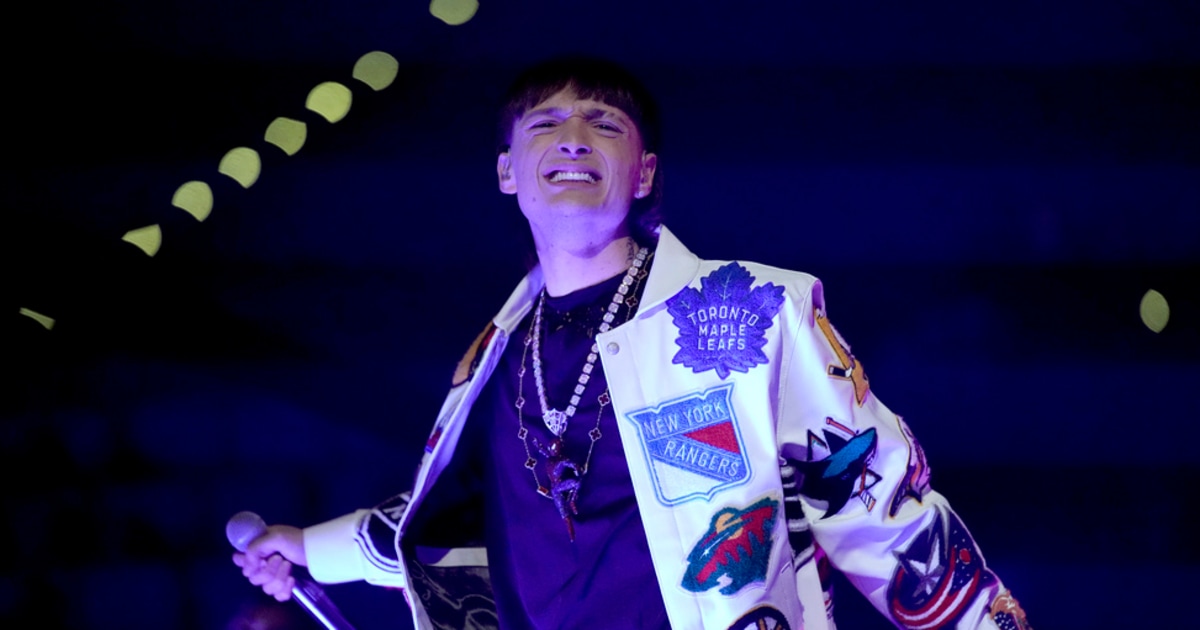
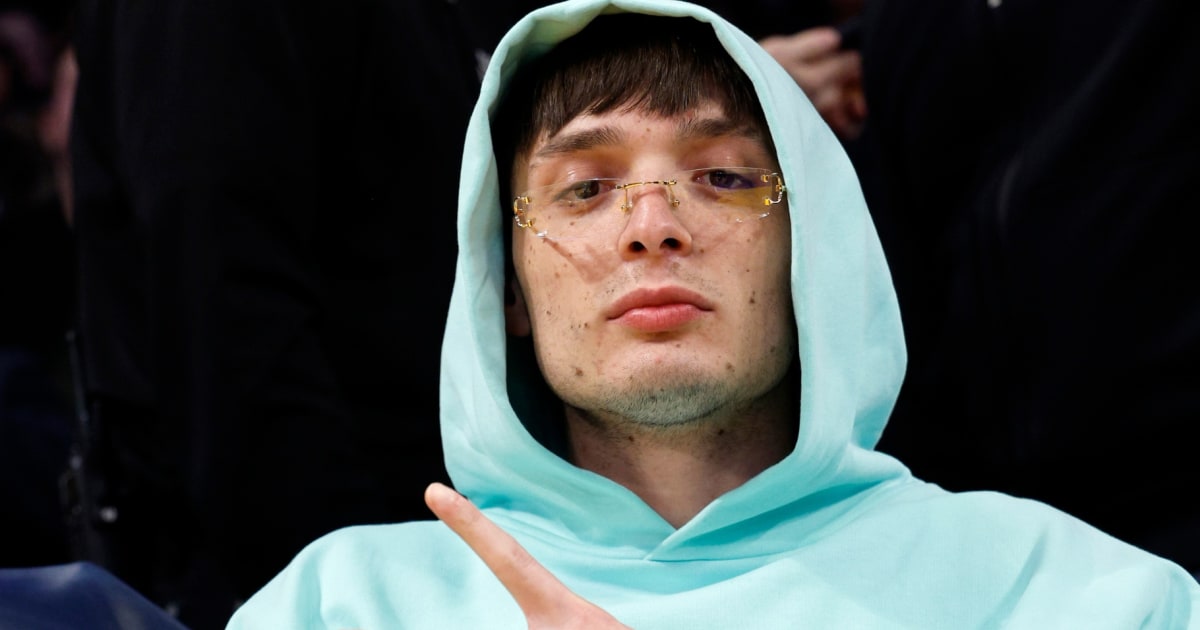
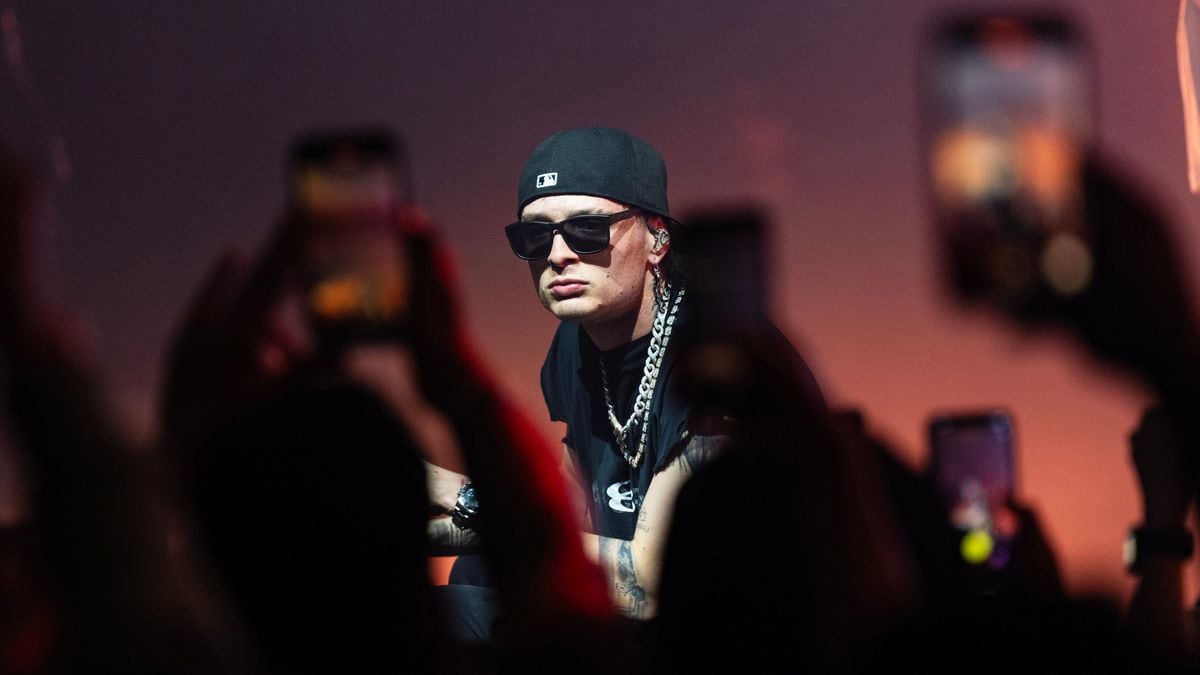
/cloudfront-eu-central-1.images.arcpublishing.com/prisa/NST7LXLRJJCJHECF44EHF4NZDI.JPG)
